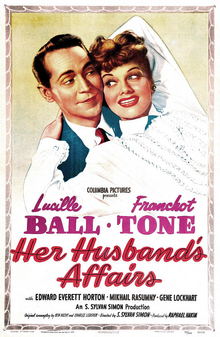| Her Husband's Affairs | |
|---|---|
 Theatrical release poster | |
| Directed by | S. Sylvan Simon |
| Screenplay by | |
| Produced by | Raphael Hakim |
| Starring | |
| Cinematography | Charles Lawton Jr. |
| Edited by | Al Clark |
| Music by | George Duning |
Production company | Cornell Pictures |
| Distributed by | Columbia Pictures |
Release date |
|
Running time | 85 minutes |
| Country | United States |
| Language | English |
| Box office | $1.5 million [1] |
Her Husband's Affairs is a 1947 American romantic comedy film directed by S. Sylvan Simon and starring Lucille Ball, Franchot Tone and Edward Everett Horton. [2] It was released by Columbia Pictures.